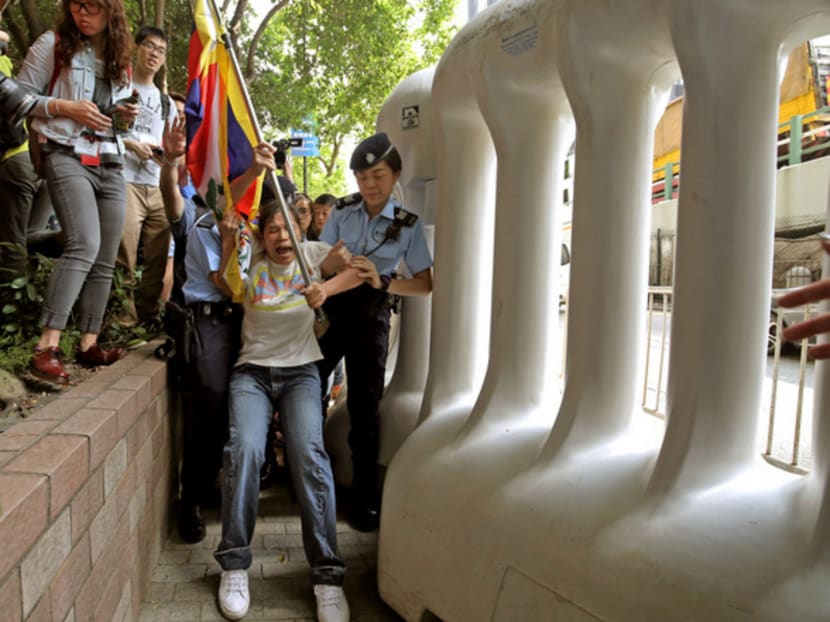Protests in HK over Zhang visit despite big clampdown
HONG KONG — The heart of Hong Kong resembled an armed camp yesterday as thousands of police officers were deployed around a hotel and convention centre where a senior Chinese official was visiting, in a show of force against protesters increasingly worried that the city’s civil liberties and autonomy are under attack by the central government in Beijing.

A protester being taken away by the police on the second day of Chinese official Zhang Dejiang’s visit to the city.
Hong Kong has been on high alert during Mr Zhang’s trip, deploying up to 6,000 police officers each day. Photo: Reuters
HONG KONG — The heart of Hong Kong resembled an armed camp yesterday as thousands of police officers were deployed around a hotel and convention centre where a senior Chinese official was visiting, in a show of force against protesters increasingly worried that the city’s civil liberties and autonomy are under attack by the central government in Beijing.
It has been a humbling week for China. The world’s biggest economy after the United States, it is richer and stronger than it has ever been, and its financial clout is being felt the world over. But Beijing is finding it exceedingly difficult to win hearts and minds in its own backyard, among the more than 30 million Chinese-speaking people of Hong Kong and Taiwan.
“There are more centrifugal forces, and it’s hard for Beijing to deal with these forces,” said Dr Jean-Pierre Cabestan, a professor of government and international studies at Hong Kong Baptist University. “I think it is a clash between two political cultures: Authoritarian in China and liberal in Hong Kong and Taiwan. Hong Kong is very much on the bridge, resisting the authoritarian political culture in China.”
The visiting Chinese official, Mr Zhang Dejiang, who chairs China’s communist-controlled legislature and is the highest-ranking state leader to visit Hong Kong in four years, assured residents yesterday evening that they do not need to worry about their city losing its identity and being absorbed into the mainland, in a sign of Beijing’s clearest indication that the governing principle of “one country, two systems” would not be changed.
“One country, two systems has … won wide recognition in the international community,” he was quoted as saying by the Hong Kong media. “This did not come easily, and deserves pride and protection.”
Earlier yesterday in his keynote speech at a conference on Chinese President Xi Jinping’s signature “One Belt, One Road” infrastructure initiative, Mr Zhang urged Hong Kong to “take a more active part in the national development strategy”.
“I hope that Hong Kong, with a broader mind and vision, would fully seize the major opportunities of the Belt and Road, link its own development with the Belt and Road, and further bring out its own advantages,” he said.
He said the Chinese-ruled territory can focus on four areas to support One Belt, One Road, namely Hong Kong’s professional sectors, yuan internationalisation, people-to-people exchanges and cooperation with the mainland on developing Belt and Road businesses.
Hong Kong has been on high alert during Mr Zhang’s three-day visit, which ends today, deploying up to 6,000 police officers for each day of the trip and establishing a broad security cordon to keep protesters more than a block from the convention centre where Mr Zhang spoke yesterday, citing fears of demonstrations and international terrorism.
Some locals drew scathing comparisons between the three-day stay by Mr Zhang and visits by Queen Elizabeth II in 1975 and 1986, when Hong Kong was still a British colony.
“He must feel fearful and guilty, so he needs such high security and fears any contact with the people,” said Mr Raphael Wong, vice-chairman of the pro-democracy League of Social Democrats.
Ultimately, in both Hong Kong and Taiwan, the generations now moving into positions of responsibility increasingly view themselves as separate from China, and that rise of identity politics “could pose grave political challenges to Beijing”, said Dr Zhang Baohui, a professor of political science at Lingnan University in Hong Kong.
He said this as Taiwan is preparing for the inauguration of Dr Tsai Ing-wen tomorrow as the island’s first female President. She was swept into power in part by young voters anxious about what they see as Beijing’s rising influence in Taiwan. Agencies





